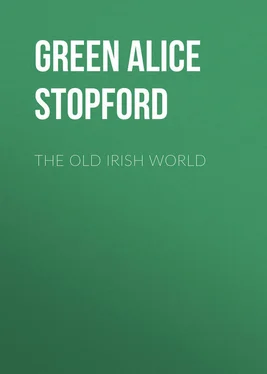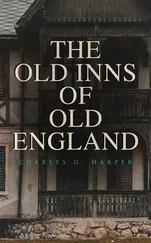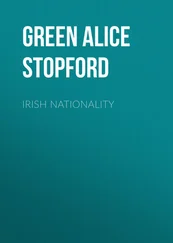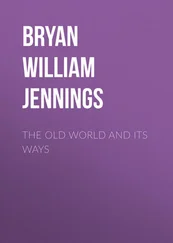Alice Green - The Old Irish World
Здесь есть возможность читать онлайн «Alice Green - The Old Irish World» — ознакомительный отрывок электронной книги совершенно бесплатно, а после прочтения отрывка купить полную версию. В некоторых случаях можно слушать аудио, скачать через торрент в формате fb2 и присутствует краткое содержание. Жанр: literature_19, foreign_antique, foreign_prose, Историческая проза, на английском языке. Описание произведения, (предисловие) а так же отзывы посетителей доступны на портале библиотеки ЛибКат.
- Название:The Old Irish World
- Автор:
- Жанр:
- Год:неизвестен
- ISBN:нет данных
- Рейтинг книги:4 / 5. Голосов: 1
-
Избранное:Добавить в избранное
- Отзывы:
-
Ваша оценка:
- 80
- 1
- 2
- 3
- 4
- 5
The Old Irish World: краткое содержание, описание и аннотация
Предлагаем к чтению аннотацию, описание, краткое содержание или предисловие (зависит от того, что написал сам автор книги «The Old Irish World»). Если вы не нашли необходимую информацию о книге — напишите в комментариях, мы постараемся отыскать её.
The Old Irish World — читать онлайн ознакомительный отрывок
Ниже представлен текст книги, разбитый по страницам. Система сохранения места последней прочитанной страницы, позволяет с удобством читать онлайн бесплатно книгу «The Old Irish World», без необходимости каждый раз заново искать на чём Вы остановились. Поставьте закладку, и сможете в любой момент перейти на страницу, на которой закончили чтение.
Интервал:
Закладка:
A new examination of Irish history is indeed of the utmost importance to our people. The leading reviews, text-books, and histories in England with one accord have presented Ireland to the English people under the “savage” aspect, and their statements have been too frequently accepted. Hear the common opinion as Tennyson put it: “Kelts are all made furious fools… They live in a horrible island, and have no history of their own worth the least notice. Could not anyone blow up that horrible island with dynamite and carry it off in pieces – a long way off?” The same gloomy picture is still spread before England. Mr. Fletcher, a Fellow of All Souls, records that “it was quite common to bleed a cow for a refreshing drink of blood,” and that “there were no exports save the said cow-skins,” though with these the Irish apparently managed to buy “red seas of claret.” Shane O’Neill was killed “by his own people whom he was plundering!” Degradation was universal, as we learn from a sentence absolutely amazing in its colossal and unscrupulous ignorance – “though his name had once been FitzNigel or de Burgh, it gradually became O’Neill or O’Bourke!” Mr. Rudyard Kipling joins Mr. Fletcher in declaring that Irish history “was all broken heads and stolen cows, as it had been for a thousand years,” and that Irishmen had no interest or care for their religion till they discovered a use for it as a warcry against England. Accounts of Ireland equally contrary to fact and common sense serve in political controversy. English politicians assert on platforms that Irishmen of themselves had never any national life or duty at all, that the first gleam of true patriotism was taught them by England since the Union, that Ireland had no conception of a Parliament till England gave it to her people, when the boon was so misused and misunderstood by an incompetent race (the English in Ireland, be it remembered) that in the higher interests of man it had to be withdrawn. As for the desire of self-government, “some people said it was a matter of historical sentiment. The humour of it was that there never was a real Irish kingdom at all. The Parliament which it was sought to restore to Ireland was given to it by England. The historical sentiment and loyalty which Mr. John Redmond was talking was the greatest humbug that was ever preached.” There are others who argue, Dr. Mahaffy among them, that practically there is not any more a Celtic race in Ireland, but one so mixed in blood that it no longer, if it ever did, contains the materials of a nation. The Celtic people, to their honour, have never denied a national brotherhood to Danes, Normans, English, or Palatines, who loyally entered into the Irish commonwealth. But as to political theories of the vanishing of the race, we have only to examine them by known facts, and turn to the Report of the Registrar-General in 1909 for proof that in the mingling of peoples the Celtic is still the predominant element over all the rest; and if this proof is conclusive, even in the register of merely Irish names, how enormous would be its increased weight if we could reckon in Celtic families the change from Irish names which has gone on ceaselessly since the thirteenth century, and is still constantly occurring at this moment – a change which, however lamentable, cannot alter the blood and the inheritance.
Irishmen are often warned to waste no time in looking back at the past. But if England draws the moral from her interpretation of history, we must learn our lesson too – only it must be a lesson more serious, exact, and worthy of an educated people. We have had experience of how profound and vicious may be the practical effect of a history unscientific, irresponsible, prejudiced, and incomplete. Out of ignorance of the past, what sound policy can grow for the future? I suppose that in civilized Europe, among the speeches on State affairs of prominent statesmen, we could find no parallel to historical verdicts so crude and unsubstantial as those which are given to us by a certain group of political leaders and writers in England, concerning the Irish portion of the “Empire” of which they make their boast. How many are the ignorances and negligences which still do service unreproved among those who claim to be the chief upholders of a “United Kingdom,” and exponents of the “Imperial” faith.
In Ireland we have still indeed a heavy road to travel. When history has been written, what about the teaching of it, or the learning, in this country? Who will make the way free for that?
Let me put this matter before you by way of contrast. You have heard the fame of Sparta, the land of heroes who won at the Thermopylæ a far-shining glory that will ever stir the hearts of men. Montaigne reminds us that in the matchless policy of Sparta to build up a noble State, it is worthy of great consideration that the education of the children was the first and principal charge. “And, therefore, was it not strange,” he says, “if Antipater requiring fifty of their children for hostages, they answered clean contrary to what we would do, ‘that they would rather deliver him twice so many men’; so much did they value and esteem the loss of their country’s education.” Now in this training up of men to be citizens of the finest quality, the only one book-study absolutely enforced in Sparta was History – to the mockery and contempt of neighbouring Doctors of letters and literature of the time. “Idiots and foolish people,” scoffed the high-class Athenian professor, adept in polite languages and fine phrasing and the elegancies of culture, and not neglectful of the profits to be got by professing them; “idiots and foolish people, who only amuse themselves to know the succession of kings, and establishing and declination of estates, and such-like trash of flim-flam tales.” Socrates, you may be sure, did not join in these sarcasms. Sparta had shown the honour and manhood that history can teach, and how it can make of men champions of their country, keepers of their forefathers’ fame, and rivals of their own ancient heroes.
Side by side with this ancient instance we may put one of our own day. There is a country which has suddenly risen to great eminence in war and organisation, as it had long been famous in the arts, with which England hastened to make alliance. That country is Japan. In Japan, when the eldest son comes of age, it is the custom for his father to take him a tour on foot round the country, visiting every place of fame in its history, so that the youth may enter on man’s estate as a worthy citizen of the State that bred him. These honourable pilgrims can be met on every road. They have known, like the men of Sparta, the power of history to fortify the mind and expand the soul. Every Japanese man of character will tell you that in any serious enterprise he is in the presence, in the company of the great Dead of his people. That by them his purpose is ennobled, his courage uplifted, his solitude changed into a great communion. We have seen how that spirit has exalted a people.
With such instances in our minds we may ask what we are doing in Ireland. What kind of citizens are we building up for our own land?
As in England, so in Ireland, history has in the last dozen years been made compulsory in the schools. But there is a difference. For Ireland history is not a subject in itself. In our primary and intermediate education Irish history is now a department of English language and literature. At the age when impressions made on a youth’s mind are certain to become the all-compelling habits of his later life, it is suggested to him that the history of his country is less important than the rules of English grammar, and that the achievements of his father may at the best rank with the model sentences in which English essayists write of Friendship and Gardens and Christmas. The student for honours under the Intermediate system may, at his own will, prefer a continental language to history. A pass-student might choose to gain all the necessary marks in English grammar and composition alone; if he has drunk in all that the amiable and unimportant Alexander Smith can tell him “Of the Importance of a Man to Himself,” he may omit all that the world can tell him “Of the Importance of a Man to his Country,” or of his Country to him. Such knowledge may be left to the “idiots and foolish people, who only amuse themselves to know the succession of kings, and establishing and declination of estates, and such-like trash of flim-flam tales.”
Читать дальшеИнтервал:
Закладка:
Похожие книги на «The Old Irish World»
Представляем Вашему вниманию похожие книги на «The Old Irish World» списком для выбора. Мы отобрали схожую по названию и смыслу литературу в надежде предоставить читателям больше вариантов отыскать новые, интересные, ещё непрочитанные произведения.
Обсуждение, отзывы о книге «The Old Irish World» и просто собственные мнения читателей. Оставьте ваши комментарии, напишите, что Вы думаете о произведении, его смысле или главных героях. Укажите что конкретно понравилось, а что нет, и почему Вы так считаете.












